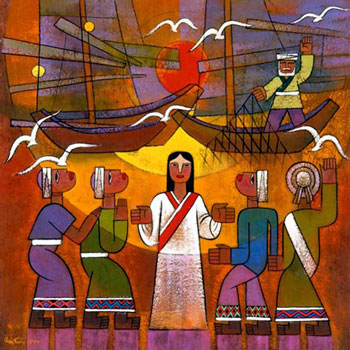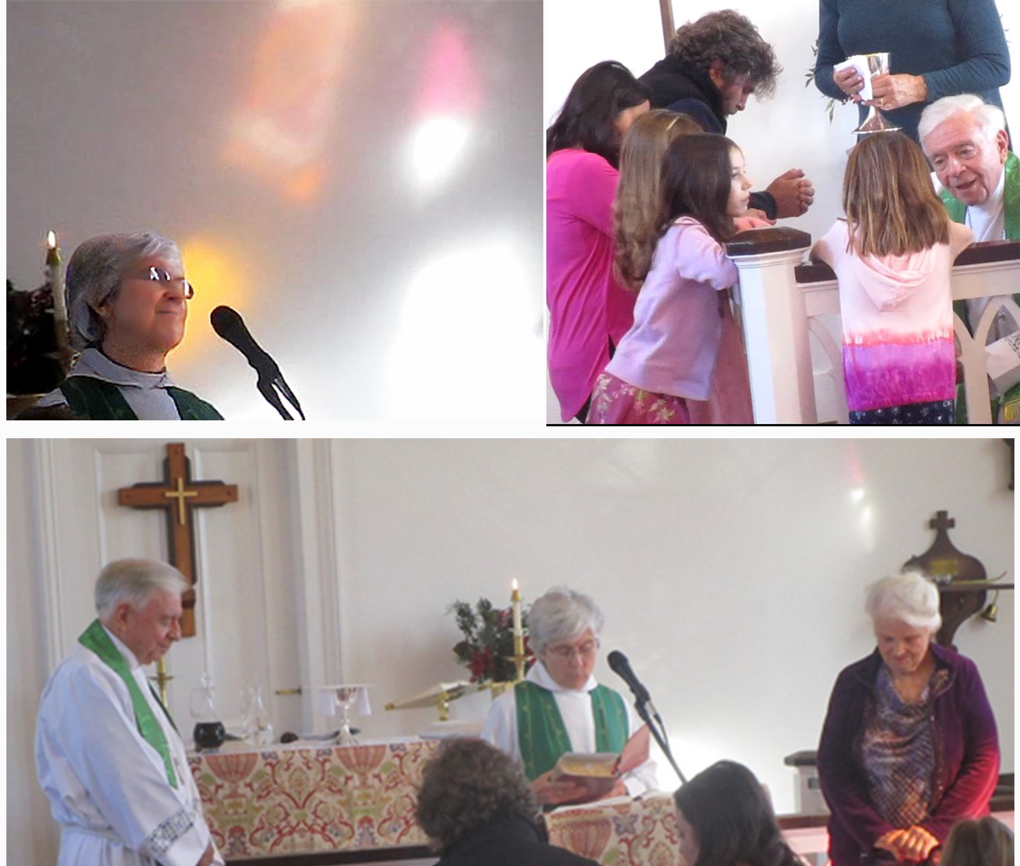I.Theme – Discipleship and calling

"Calling Disciples" –He Qi (2001)
The lectionary readings are here or individually:
Old Testament – 1 Samuel 3:1-10(11-20)
Psalm – Psalm 139:1-5, 12-17
Epistle –1 Corinthians 6:12-20
Gospel – John 1:43-51
Samuel – calling Samuel
Paul – call to honor their bodies.
John – calling Philip and Nathanael
From Bruce Epperly "Process and Faith"
"Today’s readings describe the many faces of revelation. God’s presence and activity is both intimate and global. The heavens declare the glory of God and God’s glory is also revealed through the chanting of toddlers, nocturnal whispers, beating hearts, and adult inspirations. God is as equally present in our cells as in our souls. Our universe is omni-centered, that is, all things exist as a result of God’s energy and inspiration coursing through them.There are no God-forsaken places or persons – we are challenged to experience, honor, and support God’s movements in all creation. While this may complicate our ethical decision-making, it opens us to a world of wonder and beauty, appropriate to the Season after the Epiphany.
"Despite our turning from God, God is always turning toward us. There is hope for transformation in the most dire situations and most despicable people.
"The call of Samuel reminds us that children as well as adults can be God’s messengers to the world. God is moving through boys and girls listening to a children’s sermon or having their diapers changed in the church nursery. Samuel is both an unlikely and likely candidate for divine inspiration. He is a child and hardly expected to hear the voice of God, and yet he does. Yet, from the beginning of his life, he was a child of promise – his mother dedicated him to God and her fidelity to her promise may have opened unexpected pathways of divine presence in his life.
"In seeing and honoring God’s presence in our children – and that means all children! – we awaken energies of growth and inspiration within them and ourselves.
"The call of Samuel reminds us that divine inspiration requires a community to be fully understood. After all, God’s voice comes in the context and through the many voices of our lives. It takes a process of discernment to discover which of the voices in our lives is most authentic to our vocation as God’s loving and beloved children. Samuel seeks the guidance of Eli.
"We all need mentors who, in non-possessive ways, call forth our ability to hear God’s voice and movements in our lives. Samuel’s call in not just personal or individual, it is contextual. Our calls, accordingly, draw us deeper into our own experiences and yet lure us toward care for the larger community. The journey of revelation is always both inward and outward, and needs a community of discernment to mature and find direction.
"Psalm 139: 1-18 places each life in a divine environment. We live and move and have our being in relationship to God. God’s care and character determine God’s presence, action, and awareness of us. God is not out to get us or use divine knowledge to punish us. God fully knows us and fully loves us. This inspires both wonder and gratitude. More than that, God’s love leads to creating us as awesome and wonder-full from the moment of conception. Questions of “when life begins” are foolish from the Psalmist’s perspective and should not enter the political conversations of right and left, nor Christian arguments for the legality or prohibition of abortion.
"The Psalmist is clear that God cares for the fetus, and that shouldn’t be a matter of controversy even for those who support abortion rights. We cannot devaluate fetal life to affirm the lives of women. Both are valuable and cherished by God. This makes life and death decisions more complicated – and involves weighing contrasting values – but in the complication we may discover broader community and individual answers that honor both women and unborn children. (For more on ethics in the context of divine omnipresence, see Bruce Epperly, Process Theology: A Guide for the Perplexed, Continuum and Emerging Process: Adventurous Theology for a Missional Church, Parson’s Porch.)
"Divine activity sustains all things. Divine knowledge embraces all things. Divine presence supports all things. I purposely added verses 7-12 to today’s readings to render a more holistic reading of the Psalm. It is a Psalm of wonder and gratitude, of insight and inspiration, that has profound implications for how we view ourselves and others. We are wonderfully made – we are beautiful – and so is every other God-loved child.
"Today’s readers need not get bogged down on the minutia of I Corinthians 12. The passage speaks of temple prostitution and spirituality and sexuality, but it is really about the affirmation and care of our bodies. There is no mind-body dualism here: when Paul speaks of the body as the temple of God, he is clear that the body is connected with the spirit – each shapes the other. The spirit is embodied and the body is inspired. Our bodies are temples, that is, shrines to divine wisdom and deserve both affirmation and care. Glorify God in your bodies implies that we are to treat our bodies as expressions of divinity – this applies to our diet, sexuality, and lifestyle.
"It also applies to our care for the bodies of others. Recent allegations of child sexual abuse in major university sports programs remind and challenge us to support the safety of every child. More than that, we are called as churches to honor all bodies and perceive and affirm the goodness of all creation. This involves feeding hungry bodies, restoring broken bodies, healing sick bodies, and affirming all bodies as beloved by God.
"There are no perfect bodies. Nor are a culture’s standards of beauty absolute. Rather, the church is called to be counter-cultural: to promote wellness, but also to see God’s wonder in every body. We are all awesomely made. We need to see and bring forth beauty where others see ugliness.
"The gospel story presents Jesus’ call to Philip and Nathaniel. While the details of Jesus’ call are sparse, the scripture points out that God calls people in everyday life. Adults can open the doors of perception, experience divinity, and come to God in child-like spirits. John’s gospel describes a community of call in which our experiences of call and vocational inspiration inspire us to invite others to be part of the Jesus’ movement. There is no compulsion here, just invitation. “Come and see.” For those who respond, the heavens open up, new horizons emerge, and our lives are forever transformed.
"The call of God goes forth – everywhere. The doctrines of omnipresence, omniscience, and omni-activity (omnipotence) are not stale era pieces, irrelevant to our lives, but invitations to adventure – to see God everywhere, to experience God in our daily lives, to honor embodiment, and welcome revelation whenever and wherever it occurs. We are to be discerning and ask questions of ourselves and others when we have had mystical experiences. In the questioning, inspired by a sense of holiness in all moments and all creatures, we will discover God’s voice amid the voices, and God’s pathways amid the pathways we travel individually and as communities. "
Read more








